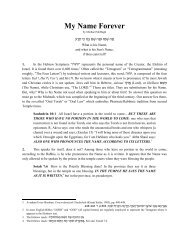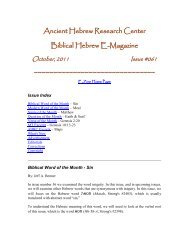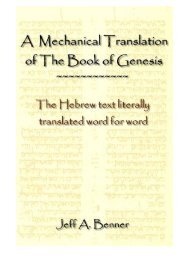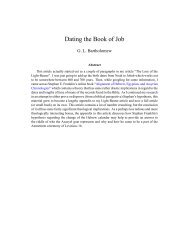- Page 2 and 3: Ancient Hebrew Language and Alphabe
- Page 4 and 5: Ancient Hebrew Language and Alphabe
- Page 6 and 7: Ancient Hebrew Language and Alphabe
- Page 8 and 9: Ancient Hebrew Language and Alphabe
- Page 10 and 11: Ancient Hebrew Language and Alphabe
- Page 12 and 13: Ancient Hebrew Language and Alphabe
- Page 14 and 15: Ancient Hebrew Language and Alphabe
- Page 16 and 17: Ancient Hebrew Language and Alphabe
- Page 18 and 19: Ancient Hebrew Language and Alphabe
- Page 20 and 21: Ancient Hebrew Language and Alphabe
- Page 22 and 23: Ancient Hebrew Language and Alphabe
- Page 24 and 25: Ancient Hebrew Language and Alphabe
- Page 26 and 27: Ancient Hebrew Language and Alphabe
- Page 28 and 29: Ancient Hebrew Language and Alphabe
- Page 30 and 31: Ancient Hebrew Language and Alphabe
- Page 32 and 33: Ancient Hebrew Language and Alphabe
- Page 34 and 35: Ancient Hebrew Language and Alphabe
- Page 36 and 37: Ancient Hebrew Language and Alphabe
- Page 38 and 39: Ancient Hebrew Language and Alphabe
- Page 40 and 41: Ancient Hebrew Language and Alphabe
- Page 42 and 43: Parent Roots Ancient Hebrew Languag
- Page 46 and 47: Ancient Hebrew Language and Alphabe
- Page 48 and 49: Ancient Hebrew Language and Alphabe
- Page 50 and 51: Ancient Hebrew Language and Alphabe
- Page 52 and 53: Ancient Hebrew Language and Alphabe
- Page 54 and 55: Ancient Hebrew Language and Alphabe
- Page 56 and 57: Ancient Hebrew Language and Alphabe
- Page 58 and 59: Ancient Hebrew Language and Alphabe
- Page 60 and 61: Appendix A - Alphabet Reconstructio
- Page 62 and 63: Appendix A - Alphabet Reconstructio
- Page 64 and 65: Appendix A - Alphabet Reconstructio
- Page 66 and 67: Appendix A - Alphabet Reconstructio
- Page 68 and 69: Appendix A - Alphabet Reconstructio
- Page 70 and 71: Appendix A - Alphabet Reconstructio
- Page 72 and 73: Appendix A - Alphabet Reconstructio
- Page 74 and 75: Appendix A - Alphabet Reconstructio
- Page 76 and 77: Appendix A - Alphabet Reconstructio
- Page 78 and 79: Picture Appendix B - Learn Ancient
- Page 80 and 81: Appendix B - Learn Ancient Hebrew P
- Page 82 and 83: Picture: Foot English Letter: G App
- Page 84 and 85: Appendix B - Learn Ancient Hebrew P
- Page 86 and 87: Appendix B - Learn Ancient Hebrew P
- Page 88 and 89: Appendix B - Learn Ancient Hebrew P
- Page 90 and 91: Appendix B - Learn Ancient Hebrew P
- Page 92 and 93: Appendix B - Learn Ancient Hebrew P
- Page 94 and 95:
Appendix B - Learn Ancient Hebrew P
- Page 96 and 97:
Appendix B - Learn Ancient Hebrew P
- Page 98 and 99:
Appendix B - Learn Ancient Hebrew P
- Page 100 and 101:
Appendix B - Learn Ancient Hebrew P
- Page 102 and 103:
Appendix B - Learn Ancient Hebrew E
- Page 104 and 105:
Appendix C - History of the Hebrew
- Page 106 and 107:
Appendix C - History of the Hebrew
- Page 108 and 109:
Appendix C - History of the Hebrew
- Page 110 and 111:
Appendix C - History of the Hebrew
- Page 112 and 113:
Appendix C - History of the Hebrew
- Page 114 and 115:
Appendix C - History of the Hebrew
- Page 116 and 117:
Appendix C - History of the Hebrew
- Page 118 and 119:
Appendix C - History of the Hebrew
- Page 120 and 121:
Appendix C - History of the Hebrew
- Page 122 and 123:
Appendix C - History of the Hebrew
- Page 124 and 125:
Appendix C - History of the Hebrew
- Page 126 and 127:
Appendix E - Parent Root Dictionary
- Page 128 and 129:
Appendix E - Parent Root Dictionary
- Page 130 and 131:
Appendix E - Parent Root Dictionary
- Page 132 and 133:
Appendix E - Parent Root Dictionary
- Page 134 and 135:
Appendix E - Parent Root Dictionary
- Page 136 and 137:
Appendix E - Parent Root Dictionary
- Page 138 and 139:
Appendix E - Parent Root Dictionary
- Page 140 and 141:
Appendix E - Parent Root Dictionary
- Page 142 and 143:
Appendix E - Parent Root Dictionary
- Page 144 and 145:
Appendix E - Parent Root Dictionary
- Page 146 and 147:
Appendix E - Parent Root Dictionary
- Page 148 and 149:
Appendix E - Parent Root Dictionary
- Page 150 and 151:
Appendix E - Parent Root Dictionary
- Page 152 and 153:
Appendix E - Parent Root Dictionary
- Page 154 and 155:
Appendix E - Parent Root Dictionary
- Page 156 and 157:
Appendix E - Parent Root Dictionary
- Page 158 and 159:
Appendix E - Parent Root Dictionary
- Page 160 and 161:
Appendix E - Parent Root Dictionary
- Page 162 and 163:
Appendix E - Parent Root Dictionary
- Page 164 and 165:
Appendix E - Parent Root Dictionary
- Page 166 and 167:
Appendix E - Parent Root Dictionary
- Page 168 and 169:
Appendix E - Parent Root Dictionary
- Page 170 and 171:
Appendix E - Parent Root Dictionary
- Page 172 and 173:
Appendix E - Parent Root Dictionary
- Page 174 and 175:
Appendix E - Parent Root Dictionary
- Page 176 and 177:
Appendix E - Parent Root Dictionary
- Page 178 and 179:
Appendix E - Parent Root Dictionary
- Page 180 and 181:
Appendix E - Parent Root Dictionary
- Page 182 and 183:
Appendix E - Parent Root Dictionary
- Page 184 and 185:
Appendix E - Parent Root Dictionary
- Page 186 and 187:
Appendix E - Parent Root Dictionary
- Page 188 and 189:
Appendix E - Parent Root Dictionary
- Page 190 and 191:
Appendix E - Parent Root Dictionary
- Page 192 and 193:
Appendix E - Parent Root Dictionary
- Page 194 and 195:
Appendix E - Parent Root Dictionary
- Page 196 and 197:
Appendix E - Parent Root Dictionary
- Page 198 and 199:
Appendix E - Parent Root Dictionary
- Page 200 and 201:
0352 012 0353 012 0354 012 0355 012
- Page 202 and 203:
1817 078 1818 079 1819 079 1820 079
- Page 204 and 205:
3332 393 3333 393 3334 394 3335 394
- Page 206 and 207:
4617 344 4618 344 4624 349 4626 350
- Page 208 and 209:
6580 373 6581 373 6595 374 6596 374
- Page 210 and 211:
7987 452 7988 452 7997 452 7998 452
- Page 212 and 213:
036 4000 036 4011 036 4963 036 8394
- Page 214 and 215:
156 2253 156 2325 156 2326 156 4224
- Page 216 and 217:
258 8438 258 8529 259 3217 260 3887
- Page 218 and 219:
334 4150 334 4151 334 4152 334 4154
- Page 220 and 221:
408 7039 408 7043 408 7044 408 7045
- Page 222 and 223:
459 4945 459 7783 459 7784 459 7785
- Page 224 and 225:
Bibliography Hebrew Culture · Will
- Page 226 and 227:
Bibliography Ancient Language and O
- Page 228 and 229:
Notes _____________________________
- Page 230:
Notes _____________________________






